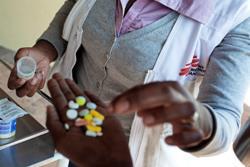Informal settlement may have to move for water


Located just outside Ermelo, Skaaprus sprung up alongside one of Mpumalanga’s coal mines and is home to an estimated 500 residents. In 2012, Msukaligwa Municipality built one borehole for the community.
In June 2013, OurHealth reported about Skaaprus’ 25-year battle for clean water.
Months later the municipality built three more boreholes. However, community members say these new boreholes are still not working, which forces them to rely on nearby streams for water.
“We don’t have clean water, and there is no electricity,” said Skaaprus resident Andile Skhosana. “Our living conditions haven’t changed, and sometimes it feels like we have been forgotten.”
Community members say that while they are not confident that the stream water is clean, they prefer it to borehole water.
“We end up using the water from the streams because the borehole water smells even when it’s boiled or bleached,” Delisili Malindzisa told OurHealth.
“Most of us can’t afford to buy clean water because we are poor and unemployed,” said Malindzisa, adding that there is also often not enough borehole water for everyone. “Our health is at risk.”
Ward Counsellor Zodwa Nkosi says that while she understands the community’s frustrations, the municipality can do little unless the community relocates to municipal property.
“The municipality cannot provided water and electricity until they move to an area owned by the municipality,” said Nkosi, who added that municipal boreholes were only meant to assist the community until they relocated and were never meant to be permanent. “If they move, we will be able to resolve their problems.”
Read more: SAHRC: Water, sanitation services in crisis
An edited version of this story first appeared in the Khanyisa Weekly Newspaper
Author
Republish this article
This work is licensed under a Creative Commons Attribution-NoDerivatives 4.0 International License.
Unless otherwise noted, you can republish our articles for free under a Creative Commons license. Here’s what you need to know:
You have to credit Health-e News. In the byline, we prefer “Author Name, Publication.” At the top of the text of your story, include a line that reads: “This story was originally published by Health-e News.” You must link the word “Health-e News” to the original URL of the story.
You must include all of the links from our story, including our newsletter sign up link.
If you use canonical metadata, please use the Health-e News URL. For more information about canonical metadata, click here.
You can’t edit our material, except to reflect relative changes in time, location and editorial style. (For example, “yesterday” can be changed to “last week”)
You have no rights to sell, license, syndicate, or otherwise represent yourself as the authorized owner of our material to any third parties. This means that you cannot actively publish or submit our work for syndication to third party platforms or apps like Apple News or Google News. Health-e News understands that publishers cannot fully control when certain third parties automatically summarise or crawl content from publishers’ own sites.
You can’t republish our material wholesale, or automatically; you need to select stories to be republished individually.
If you share republished stories on social media, we’d appreciate being tagged in your posts. You can find us on Twitter @HealthENews, Instagram @healthenews, and Facebook Health-e News Service.
You can grab HTML code for our stories easily. Click on the Creative Commons logo on our stories. You’ll find it with the other share buttons.
If you have any other questions, contact info@health-e.org.za.
Informal settlement may have to move for water
by cynthiamaseko, Health-e News
May 15, 2014



